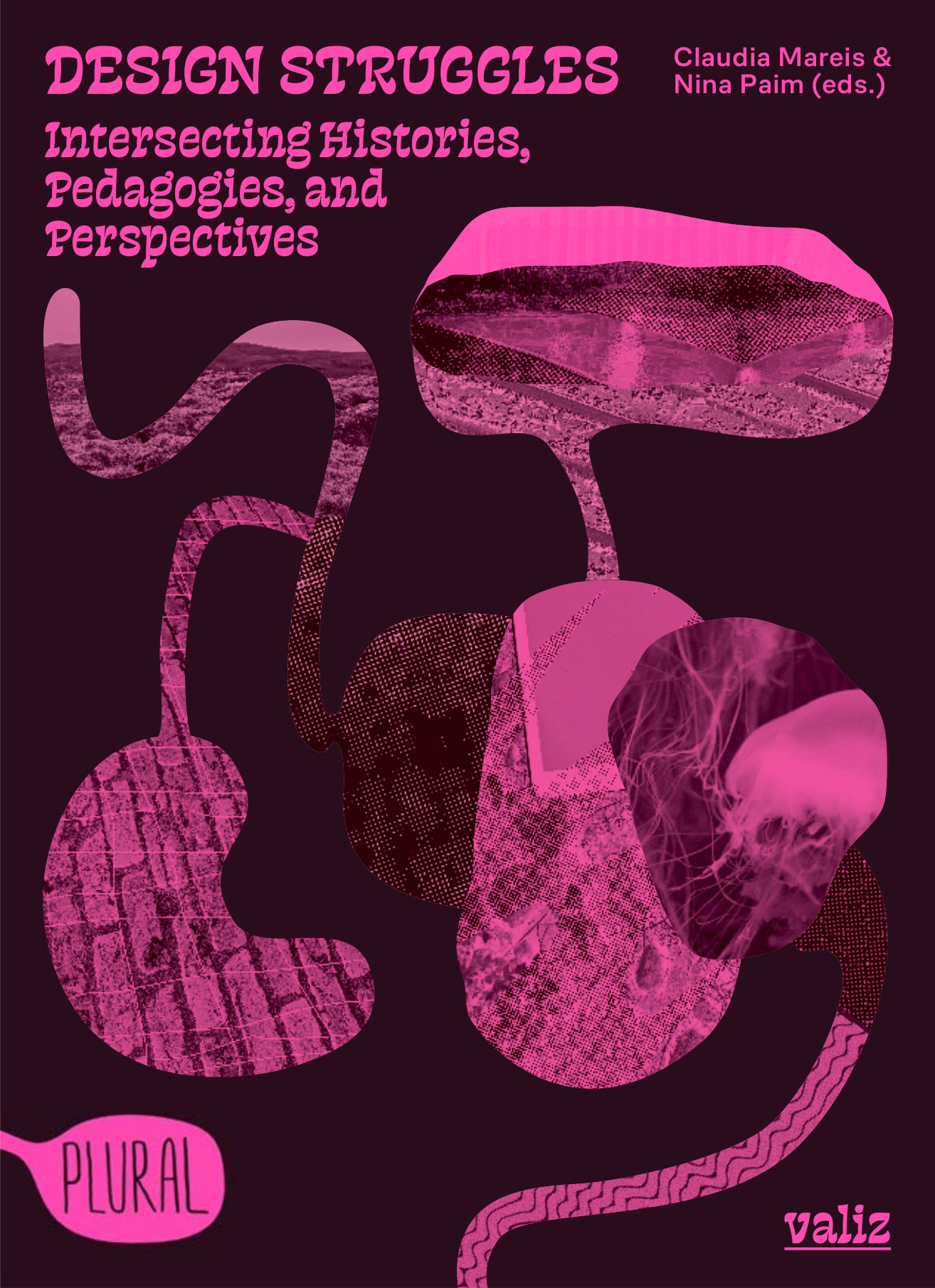Claudia Mareis, Nina Paim (eds.): Design Struggles: Intersecting Histories, Pedagogies, and Perspectives (2021)
Filed under book | Tags: · critique, decoloniality, design, design history, design research, feminism, graphic design, pedagogy, postcolonialism, precarity

“Design Struggles critically assesses the ways in which the design field is involved in creating, perpetuating, promoting and reinforcing injustice and inequality in social, political, economic, cultural and ecological systems. This book shows how this entanglement arose from Eurocentric and neoliberal thinking. The voices and practices represented here propose to question and disrupt the discipline of design from within, by problematizing the very notions of design. They aim to do so by generating new, anti-racist, post-capitalist, queer-feminist, environmentally conscious and community-based ideas on how to transform it. In this way, Design Struggles strives to forge sustainable, new practices that challenge the status quo and amplify underrepresented voices, both in the world of design, as well as beyond.
In order to reimagine design as an unbound, ambiguous, and unfinished practice, this publication gathers a diverse array of perspectives, ranging from social and cultural theory, design history, design activism, sociology, anthropology, critical and political studies, with a focus on looking at design through the intersections of gender, race, ethnicity, culture, class, and beyond. The book combines the latest comprehensive insights (rooted in design practices) with engaging and accessible storytelling. In doing so, Design Struggles brings together an urgent and expansive array of voices and views, representing those engaged in struggles with, against or around design.”
Contributors: Danah Abdulla, Tanveer Ahmed, Zoy Anastassakis, Ahmed Ansari, Brave New Alps, Johannes Bruder, Cheryl Buckley, Sria Chatterjee, Alison J. Clarke, Sasha Costanza-Chock, Paola De Martin, Decolonising Design, depatriarchise design, Bianca Elzenbaumer, Arturo Escobar, Kjetil Fallan, Griselda Flesler, Corin Gisel, Matthew Kiem, Claudia Mareis, Ramia Mazé, Tania Messell, Anja Neidhardt, Nan O’Sullivan, Maya Ober, Nina Paim, Luiza Prado de O. Martins, Mia Charlene White.
Publisher Valiz, Amsterdam, May 2021
Plural series, 3
Creative Commons BY-NC-ND 3.0 License
ISBN 9789492095886, 9492095882
411 pages
Review: Saraleah Fordyce (Design and Culture, 2021).
Comment (0)Precarity Lab: Technoprecarious (2020)
Filed under book | Tags: · care, class, gig economy, labour, precarity, technology, work

“An analysis that traces the role of digital technology in multiplying precarity.
Technoprecarious advances a new analytic for tracing how precarity unfolds across disparate geographical sites and cultural practices in the digital age. Digital technologies—whether apps like Uber, built on flexible labor, or platforms like Airbnb that shift accountability to users—have assisted in consolidating the wealth and influence of a small number of players. These platforms have also exacerbated increasingly insecure conditions of work and life for racial, ethnic, and sexual minorities; women; indigenous people; migrants; and peoples in the global south. At the same time, precarity has become increasingly generalized, expanding to include even the creative class and digital producers themselves.
This collaboratively authored multigraph analyzes the role of digital technology in multiplying precarity. The authors use the term precarity to characterize those populations disproportionately affected by the forms of inequality and insecurity that digital technologies have generated despite the new affordances and possibilities they offer. The book maps a broad range of digital precarity—from the placement of Palestinian Internet cables to the manufacture of electronics by Navajo women and from the production and deployment of drones on the U.S.–Mexico border to the technocultural productions of Chinese makers. This project contributes to, and helps bridge, ongoing debates on precarity and digital networks in the fields of critical computing, postcolonial studies, visual culture, and information sciences.”
Publisher Goldsmiths Press, London, November 2020
Creative Commons BY-NC-ND 4.0 International License
ISBN 9781912685981, 1912685981
xi+113 pages
Towards an Infrastructure of Humans (2019)
Filed under book | Tags: · art, employment, infrastructure, labour, precarity, work

“Humans can exist without an institution, yet no institution can function without humans. Institutions to a large degree are the people who work in them, but they are also more than just a group of individuals working together. What then does the institutional part of an institution contain? What allows a gathering of people to become more than the sum of all its parts? And in the age of neo-liberal self-exploitation, are institutions still operative in the interests of the individuals involved?”
“The texts and accounts here present the results of the international gathering called Humans of the Institution that took place in November 2017 in Amsterdam. The event aspired to confront the unspoken conditions of cultural employment and activity in a unique manner.”
Edited by Anne Szefer Karlsen with Vivian Ziherl and Steven ten Thije
Foreword by Charles Esche and Steven ten Thije
Publisher Van Abbemuseum, Eindhoven, 2019
Creative Commons BY-NC-SA License
ISBN 9789082902921
159 pages

